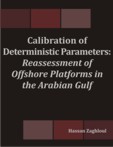Add abstract
Want to add your dissertation abstract to this database? It only takes a minute!
Search abstract
Search for abstracts by subject, author or institution
Want to add your dissertation abstract to this database? It only takes a minute!
Search for abstracts by subject, author or institution
Navigation and manipulation for autonomous underwater dismantling of offshore structures
by Christian L Welch
| Institution: | MIT and Woods Hole Oceanographic Institution |
|---|---|
| Year: | 2015 |
| Keywords: | Offshore structures; Ocean engineering |
| Posted: | 02/05/2017 |
| Record ID: | 2113278 |
| Full text PDF: | http://hdl.handle.net/1912/7725 |
The dismantling of offshore structures, known as decommissioning, is a complex task in the oil and gas industry, driven by strict environmental standards. As the environments in which decommissioning is necessary become more challenging, autonomy presents itself as a solution to conduct this work as cost-effectively and safely as possible, namely by taking Remotely Operated Vehicles (ROVs) and divers out of the equation. In this thesis, three avenues are researched in support of Autonomous Underwater Vehicles (AUVs) for decommissioning: navigation, attachment, and manipulation. First, the Iterative Closest Point method (ICP) is investigated as a means to correct position drift of an inertial navigation system, by using a previously obtained coarse map. Using real sonar data from a current decommissioning site in the Gulf of Mexico, the algorithm is able to reconcile the internally dead-reckoned pose of the vehicle with that calculated via ICP, to an accuracy of 7cm from a 100kpoint sonar scan. Second, to attach lifting points to subsea scrap without bracing onto it, a single mechanism was designed to both drill and affix anchors in a single penetration, from a vehicle in free flight. A prototype was fabricated and its functionality verified. Third, to promote robust and stable robotic interactions using an industry standard non-backdrivable manipulator, a control law was developed to have the vehicle-manipulator system passively interact with its environment, by mimicking an arrangement of masses, springs, and dashpots. This control law was tested and analyzed in a simple experiment that achieved a 90% reduction in settling time.
Want to add your dissertation abstract to this database? It only takes a minute!
Search for abstracts by subject, author or institution


|
Predicting the Admission Decision of a Participant...
|

|
Development of New Models Using Machine Learning M...
|

|
The Adaptation Process of a Resettled Community to...
A Study of the Nubian Experience in Egypt
|

|
Development of an Artificial Intelligence System f...
|

|
Theoretical and Experimental Analysis of Dissipati...
|

|
Optical Fiber Sensors for Residential Environments
|

|
Calibration of Deterministic Parameters
Reassessment of Offshore Platforms in the Arabian ...
|

|
How Passion Relates to Performance
A Study of Consultant Civil Engineers
|